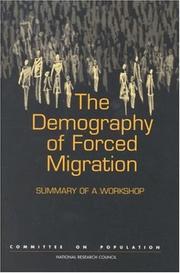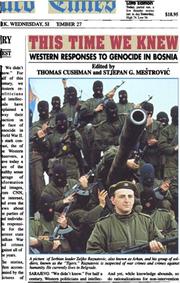| Listing 1 - 10 of 27 | << page >> |
Sort by
|
Book
ISBN: 1351214098 135121408X 1351214101 0815380070 Year: 2019 Publisher: London : Routledge,
Abstract | Keywords | Export | Availability | Bookmark
 Loading...
Loading...Choose an application
- Reference Manager
- EndNote
- RefWorks (Direct export to RefWorks)
This book explores concepts of Cultural genocide, its definitions, place in international law, the systems and methods that contribute to its manifestations, and its occurrences. Through a systematic approach and comprehensive analysis, international and interdisciplinary contributors from the fields of genocide studies, legal studies, criminology, sociology, archaeology, human rights, colonial studies, and anthropology examine the legal, structural, and political issues associated with cultural genocide. This includes a series of geographically representative case studies from the USA, Brazil, Australia, West Papua, Iraq, Palestine, Iran, and Canada. This volume is unique in its interdisciplinarity, regional coverage, and the various methods of cultural genocide represented, and will be of interest to scholars of genocide studies, cultural studies and human rights, international law, international relations, indigenous studies, anthropology, and history.
Genocide. --- Cleansing, Ethnic --- Ethnic cleansing --- Ethnic purification --- Ethnocide --- Purification, Ethnic --- Crime
Book
ISBN: 9056293648 9786610958511 1280958510 1417583622 9048505585 9781417583621 Year: 2004 Publisher: Amsterdam : Amsterdam University Press,
Abstract | Keywords | Export | Availability | Bookmark
 Loading...
Loading...Choose an application
- Reference Manager
- EndNote
- RefWorks (Direct export to RefWorks)
Genocide. --- Crimes against humanity. --- Cleansing, Ethnic --- Ethnic cleansing --- Ethnic purification --- Ethnocide --- Purification, Ethnic --- Crime --- International crimes --- Genocide --- War crimes
Book
ISBN: 9789089645241 9089645241 9048518652 Year: 2016 Publisher: Amsterdam Amsterdam University Press
Abstract | Keywords | Export | Availability | Bookmark
 Loading...
Loading...Choose an application
- Reference Manager
- EndNote
- RefWorks (Direct export to RefWorks)
The twentieth century has been called, not inaccurately, a century of genocide. And the beginning of the twenty-first century has seen little change, with genocidal violence in Darfur, Congo, Sri Lanka, and Syria. Why is genocide so widespread, and so difficult to stop, across societies that differ so much culturally, technologically, and politically? That is the question that this collection addresses, offering a range of perspectives from different disciplines to attempt to understand the pervasiveness of genocidal violence.
Genocide. --- Genocide (International law) --- Cleansing, Ethnic --- Ethnic cleansing --- Ethnic purification --- Ethnocide --- Purification, Ethnic --- International criminal law --- Crime --- Genocide

ISBN: 0309061415 9786612081699 1282081691 0309520363 0585144559 9780585144559 6612081694 9780309061414 0305061415 0309173892 Year: 1998 Publisher: Washington, DC : National Academy Press,
Abstract | Keywords | Export | Availability | Bookmark
 Loading...
Loading...Choose an application
- Reference Manager
- EndNote
- RefWorks (Direct export to RefWorks)
Forced migration --- Refugees --- Congresses. --- Refugees - Congresses. --- Business & Economics --- Demography --- Congresses --- Cleansing, Ethnic --- Compulsory resettlement --- Ethnic cleansing --- Ethnic purification --- Involuntary resettlement --- Migration, Forced --- Purification, Ethnic --- Relocation, Forced --- Resettlement, Involuntary --- Migration, Internal
Book
ISBN: 9781526125019 1526125013 9781784991968 1784991961 9781526104441 152610444X 178499197X 9780719097560 0719097568 1526116758 Year: 2015 Publisher: Manchester Manchester University Press
Abstract | Keywords | Export | Availability | Bookmark
 Loading...
Loading...Choose an application
- Reference Manager
- EndNote
- RefWorks (Direct export to RefWorks)
A pioneering investigation into the practices and methodologies used in the search for and exhumation of dead bodies resulting from mass violence.
Genocide. --- Forensic sciences. --- Dead --- Identification. --- Identification of the dead --- Criminalistics --- Forensic science --- Science --- Criminal investigation --- Cleansing, Ethnic --- Ethnic cleansing --- Ethnic purification --- Ethnocide --- Purification, Ethnic --- Crime --- History --- Human Remains --- Ethics --- Genocide --- Violence --- Identification --- Exhumation --- Burial --- Mass grave --- Poland

ISBN: 0814715346 0814715354 0814723705 9780814723708 Year: 1996 Publisher: New York, NY : New York University Press,
Abstract | Keywords | Export | Availability | Bookmark
 Loading...
Loading...Choose an application
- Reference Manager
- EndNote
- RefWorks (Direct export to RefWorks)
We didn't know. For half a century, Western politicians and intellectuals have so explained away their inaction in the face of genocide in World War II. In stark contrast, Western observers today face a daily barrage of information and images, from CNN, the Internet, and newspapers about the parties and individuals responsible for the current Balkan War and crimes against humanity. The stories, often accompanied by video or pictures of rape, torture, mass graves, and ethnic cleansing, available almost instantaneously, do not allow even the most uninterested viewer to ignore the grim reality of genocide. And yet, while information abounds, so do rationalizations for non-intervention in Balkan affairs - the threshold of real genocide has yet to be reached in Bosnia; all sides are equally guilty; Islamic fundamentalism in Bosnia is a threat to the West; it will only end when they all tire of killing each other - to name but a few. In This Time We Knew, Thomas Cushman and Stjepan G. Mestrovic have put together a collection of critical, reflective, essays that offer detailed sociological, political, and historical analyses of western responses to the war. This volume punctures once and for all common excuses for Western inaction. This Time We Knew further reveals the reasons why these rationalizations have persisted and led to the West's failure to intercede, in the face of incontrovertible evidence, in the most egregious crimes against humanity to occur in Europe since World War II.Contributors to the volume include Kai Erickson, Jean Baudrillard, Mark Almond, David Riesman, Daniel Kofman, Brendan Simms, Daniele Conversi, Brad Kagan Blitz, James J. Sadkovich, and Sheri Fink.
Genocide --- World politics --- Yugoslav War, 1991-1995. --- War in former Yugoslavia, 1991-1995 --- Yugoslav Conflict, 1991-1995 --- Yugoslav Wars of Secession, 1991-1995 --- Cleansing, Ethnic --- Ethnic cleansing --- Ethnic purification --- Ethnocide --- Purification, Ethnic --- Crime --- Yugoslav War Crime Trials, Hague, Netherlands, 1994 --- -Yugoslav War, 1991-1995. --- -Cleansing, Ethnic --- -World politics
Book
ISBN: 0821355767 9786610085675 1280085673 1417545739 Year: 2004 Publisher: Washington, DC : World Bank,
Abstract | Keywords | Export | Availability | Bookmark
 Loading...
Loading...Choose an application
- Reference Manager
- EndNote
- RefWorks (Direct export to RefWorks)
Migration. Refugees --- Economic policy and planning (general) --- Developing countries --- Economic development projects --- Land settlement --- Forced migration --- Migration, Internal --- Cleansing, Ethnic --- Compulsory resettlement --- Ethnic cleansing --- Ethnic purification --- Involuntary resettlement --- Migration, Forced --- Purification, Ethnic --- Relocation, Forced --- Resettlement, Involuntary --- Resettlement --- Settlement of land --- Colonies --- Land use, Rural --- Human settlements
Book
ISBN: 9780813592152 0813592151 9780813592176 0813592178 9780813592145 0813592143 0813592135 9780813592138 Year: 2017 Publisher: New Brunswick Rutgers University Press
Abstract | Keywords | Export | Availability | Bookmark
 Loading...
Loading...Choose an application
- Reference Manager
- EndNote
- RefWorks (Direct export to RefWorks)
Today, nearly any group or nation with violence in its past has constructed or is planning a memorial museum as a mechanism for confronting past trauma, often together with truth commissions, trials, and/or other symbolic or material reparations. Exhibiting Atrocity documents the emergence of the memorial museum as a new cultural form of commemoration, and analyzes its use in efforts to come to terms with past political violence and to promote democracy and human rights. Through a global comparative approach, Amy Sodaro uses in-depth case studies of five exemplary memorial museums that commemorate a range of violent pasts and allow for a chronological and global examination of the trend: the U.S. Holocaust Memorial Museum in Washington, DC; the House of Terror in Budapest, Hungary; the Kigali Genocide Memorial Centre in Rwanda; the Museum of Memory and Human Rights in Santiago, Chile; and the National September 11 Memorial Museum in New York. Together, these case studies illustrate the historical emergence and global spread of the memorial museum and show how this new cultural form of commemoration is intended to be used in contemporary societies around the world.
Collective memory. --- Crimes against humanity --- Political atrocities --- Genocide --- Museums. --- Cleansing, Ethnic --- Ethnic cleansing --- Ethnic purification --- Ethnocide --- Purification, Ethnic --- Crime --- Atrocities --- International crimes --- War crimes --- Collective remembrance --- Common memory --- Cultural memory --- Emblematic memory --- Historical memory --- National memory --- Public memory --- Social memory --- Memory --- Social psychology --- Group identity --- National characteristics --- Memorialization --- Historical museums. --- 911 memorial. --- 911. --- genocide. --- holocaust museum. --- holocaust. --- memorial museum. --- museums. --- september 11 memorial.
Book
ISBN: 9877225840 Year: 2020 Publisher: Ciudad de Buenos Aires, Argentina : CLACSO,
Abstract | Keywords | Export | Availability | Bookmark
 Loading...
Loading...Choose an application
- Reference Manager
- EndNote
- RefWorks (Direct export to RefWorks)
Forced migration. --- Exile (Punishment) --- Banishment --- Deportation as a punishment --- Ostracism (Exile) --- Alternatives to imprisonment --- Cleansing, Ethnic --- Compulsory resettlement --- Ethnic cleansing --- Ethnic purification --- Involuntary resettlement --- Migration, Forced --- Purification, Ethnic --- Relocation, Forced --- Resettlement, Involuntary --- Migration, Internal --- Latin America --- Mexico --- Emigration and immigration --- Social aspects. --- Asociación Latinoamericana de Libre Comercio countries --- Neotropical region --- Neotropics --- New World tropics --- Spanish America
Periodical
ISSN: 20513070 14609819 Publisher: Oxford : Refugee studies centre,
Abstract | Keywords | Export | Availability | Bookmark
 Loading...
Loading...Choose an application
- Reference Manager
- EndNote
- RefWorks (Direct export to RefWorks)
Forced migration --- Refugees --- General and Others --- Political Science --- Regional and International Studies --- Social Sciences. --- Sociology. --- Social problems --- Law --- Social Sciences --- Crime, Criminology and Law Enforcement --- Sociology --- refugees --- internal displacement --- forced migration --- Cleansing, Ethnic --- Compulsory resettlement --- Ethnic cleansing --- Ethnic purification --- Involuntary resettlement --- Migration, Forced --- Purification, Ethnic --- Relocation, Forced --- Resettlement, Involuntary --- Migration, Internal --- Forced migration. --- Refugees. --- Displaced persons --- Persons --- Aliens --- Deportees --- Exiles --- REFUGEES. --- FORCED MIGRATION. --- REFUGEE PROTECTION. --- University of Oxford. Refugee Studies Centre.
| Listing 1 - 10 of 27 | << page >> |
Sort by
|

 Search
Search Feedback
Feedback About
About Help
Help News
News